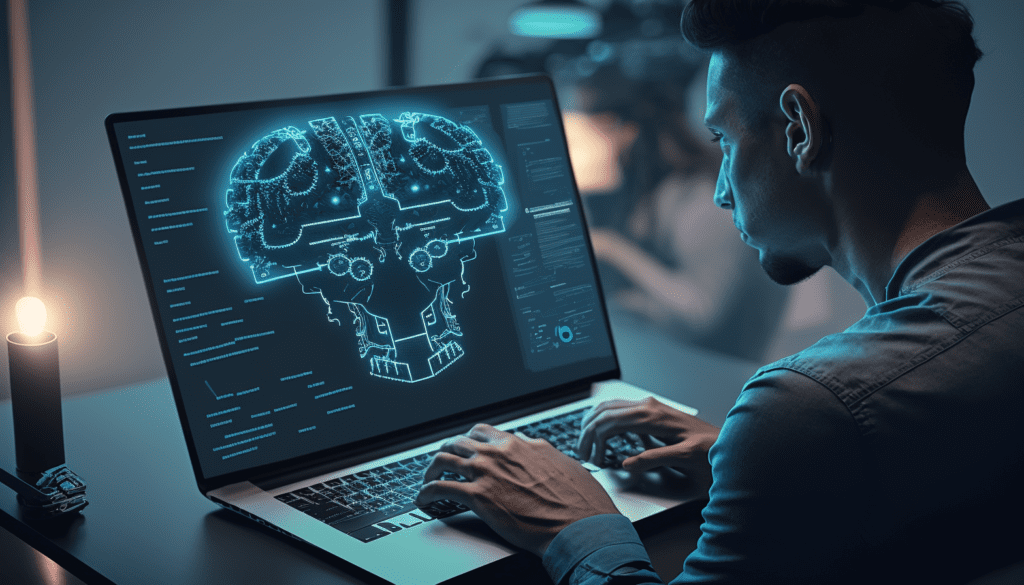The Future of Cloud Security: AI and Machine Learning
The future of cybersecurity is here, and it lies in AI and machine learning. Despite the many benefits of cloud computing, securing sensitive data has become increasingly challenging. As cyberattacks become more sophisticated, traditional security measures are no longer sufficient, making the cloud less secure. To combat these threats, organizations must embrace AI and machine learning technologies to greatly reduce the risk of data breaches. These cutting-edge technologies detect and prevent cyberattacks, analyze data, and automate security tasks.
In this article, we explore the impact of AI and machine learning on cloud security. We’ll showcase real-world examples, examine the challenges of implementation, and emphasize the importance of adopting these technologies for enhanced protection of sensitive cloud data.
AI and Machine Learning: The Next Frontier in Cloud Security


Cloud computing has brought numerous benefits to organizations, but securing sensitive data in the cloud has become a challenge. Cyberattacks are becoming more sophisticated, and traditional security measures such as firewalls and antivirus software are proving to be insufficient.
Enter AI and machine learning – the future of cloud security. These cutting-edge technologies can transform how we think about security and offer advanced protection for sensitive cloud data. Don’t forget to check our post about the best AI-powered no-code and low-code tools.
The Power of AI and Machine Learning in Cloud Security
AI and machine learning are revolutionizing cloud security, providing new and effective solutions to keep sensitive data safe from cyberattacks. With their ability to analyze massive amounts of data and detect patterns and anomalies, AI and machine learning give organizations a vital edge in preventing security incidents.
Here’s how:
- Real-time Threat Detection: AI algorithms can detect and prevent cyberattacks in real-time, offering organizations a front-line defense against persistent and sophisticated threats. AI analyzes data from various sources, including network logs and user activity, to detect anomalies and respond to threats in seconds, minimizing the risk of data breaches.
- Anomaly Detection: Machine learning algorithms analyze large amounts of data to identify patterns and anomalies that could signify a security threat. This enables organizations to quickly detect potential security incidents, preventing full-blown breaches.
- Automated Security Tasks: AI and machine learning can automate manual security tasks, reducing the risk of human error and improving security operations efficiency. This allows organizations to respond more swiftly to security incidents and minimize the impact of attacks.
Additionally, organizations can use AI and machine learning to enhance their cloud security and stay ahead of cybercriminals. These technologies are now a critical component of a comprehensive security strategy, no longer just an afterthought.
AI-Powered Cloud Security Solutions
AI is revolutionizing cloud security by providing innovative solutions to protect sensitive data. Here are some examples:
- Intrusion Detection Systems (IDS): These AI-powered systems analyze network traffic in real-time and detect anomalies that may indicate a security breach. By responding quickly, IDS reduce the risk of data breaches.
- Endpoint Protection Platforms (EPP): AI analyzes data from endpoints such as laptops and mobile devices to detect and prevent cyberattacks. EPP solutions use patterns of user behavior and anomalies to quickly detect and respond to threats, keeping sensitive data safe.
- Security Information and Event Management (SIEM) Systems: AI analyzes data from a variety of sources to detect and respond to security threats. SIEM systems provide organizations with a complete view of their security posture and can quickly identify and respond to threats.
Moreover, by using AI and machine learning, organizations can improve their cloud security and stay ahead of cybercriminals. In addition, the right tools and solutions can provide peace of mind and confidence in a rapidly changing digital landscape.
Real-World Examples of AI-Powered Cloud Security Solutions


Ready to see AI-driven cloud security solutions in action? Here are a few examples of popular offerings from some of the biggest players in the cloud computing space. Do you think that those tools will exist in the future of Cloud Security?
AWS GuardDuty
AWS GuardDuty is an AI-powered threat detection service offered by Amazon Web Services (AWS). This solution uses machine learning algorithms to analyze data from various sources, including AWS CloudTrail event logs, Amazon Virtual Private Cloud (VPC) flow logs, and DNS logs, to detect and alert on suspicious activity. With AWS GuardDuty, you can stay one step ahead of cyber criminals and ensure the security of your sensitive data in the cloud.
Microsoft Azure Security Center
Microsoft Azure Security Center is a centralized security management platform for Azure. This solution uses AI and machine learning algorithms to analyze data from various sources, including Azure resources and connected devices, to provide a comprehensive view of your security posture. Azure Security Center also includes real-time threat detection capabilities, allowing you to quickly respond to security incidents and minimize the impact of attacks.
Google Cloud Security Command Center
Google Cloud Security Command Center is a security management platform for Google Cloud. This solution uses machine learning algorithms to analyze data from various sources, including Google Cloud resources and connected devices, to provide real-time visibility into your security posture. With Google Cloud Security Command Center, you can quickly detect and respond to security incidents, and stay ahead of cyber criminals in the cloud.
Furthermore, these are just a few examples of today’s AI-powered cloud security solutions. Whether you’re looking to detect and prevent cyberattacks in real-time, or simply want to ensure the security of your sensitive data in the cloud, these solutions can help you achieve your security goals.
The Challenges of Implementing AI in Cloud Security
- Data Quality and Quantity: AI algorithms rely on large amounts of accurate data to be effective. Organizations may struggle to gather the right data, or to ensure its accuracy, which can impact the performance of AI-powered cloud security solutions.
- Integration: AI-powered cloud security solutions may need to be integrated with existing security systems and processes. This can be a complex process that requires significant investment and technical expertise.
- Cost: Implementing AI in cloud security can be expensive. Organizations need to weigh the costs of AI-powered solutions against their potential benefits, and determine if the investment is worth it.
- Trust and Interpretability: Some organizations may have concerns about the trustworthiness of AI algorithms and their ability to make decisions that align with the organization’s security objectives. The “black box” nature of AI can also make it difficult to understand and interpret the results produced by AI algorithms.
- Privacy: The use of AI in cloud security raises privacy concerns, as AI algorithms often process large amounts of sensitive data. Organizations need to ensure that AI-powered solutions are implemented in a way that protects the privacy of their customers and employees.
Despite these challenges, the benefits of AI and machine learning in cloud security are clear. As technology evolves, these challenges are likely to be overcome, and organizations will be able to fully embrace the power of AI in their security strategies.
The Importance of Embracing AI and Machine Learning
In today’s digital landscape, cloud security is more important than ever. With the rise of cloud computing, sensitive data is being stored and accessed from the cloud at an increasing rate. However, this also means that cyber threats are becoming more sophisticated and persistent.
To keep up with these threats, it’s crucial for organizations to embrace AI and machine learning for their cloud security. These cutting-edge technologies have the power to revolutionize the way we think about security and offer advanced protection for sensitive data in the cloud.
By utilizing AI algorithms to detect and prevent cyberattacks, analyze data for patterns and anomalies, and automate security tasks, organizations can greatly reduce their risk of data breaches and stay ahead of cybercriminals. This can give organizations peace of mind and confidence in a rapidly changing digital landscape.
Therefore, organizations that want to secure their sensitive data in the cloud must embrace AI and machine learning. Failure to do so will leave them vulnerable to persistent cyber threats and at a disadvantage in the digital age. The future of cloud security lies in AI and machine learning, and organizations must take advantage of these technologies to stay ahead of the game.
Final thoughts about the Future of Cloud Security
In conclusion, AI and machine learning are revolutionizing cloud security and have the potential to offer advanced protection for sensitive data. By utilizing AI algorithms to detect and prevent cyberattacks, analyze data, and automate security tasks, organizations can significantly reduce the risk of data breaches and stay ahead of cybercriminals.
However, the implementation of AI in cloud security is not without challenges. Organizations need to be prepared for the difficulties that come with incorporating AI and machine learning into their security systems.
Despite the challenges, the benefits of embracing AI and machine learning for cloud security far outweigh the difficulties. Organizations must recognize the importance of staying ahead of the curve and take advantage of the latest technology to secure their sensitive data in the cloud.

